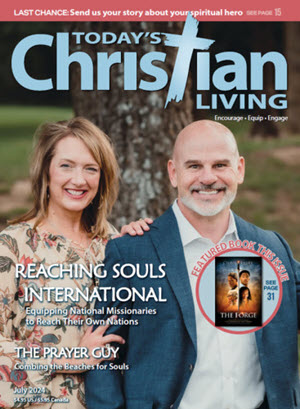By Ken Walker
As a teenager, African native Younoussa Djao burned with such zeal for his Muslim religion that he mobilized classmates to challenge Christians and seek to persuade them to convert to the Islamic faith.
This dedication continued until midway through college. Then one day he overhead a visitor to his rooming house telling another resident, “Jesus is the Son of God.” That angered Younoussa, who demanded the man explain or face a beating. Instead, the visitor told him about a former Muslim who could answer his questions. Younoussa went to meet the ex-Muslim, but only to let him know Christians had deceived him.
Younoussa wound up accepting several booklets from the convert. After reading them, he posed questions about Christ to leaders at the mosque. Not only could no one answer, Younoussa sensed that even asking questions upset many folks.
A few days later, Younoussa awoke for an early morning Ramadan prayer. Suddenly a voice proclaimed that nothing he did in Islam mattered to God and that if he remained a Muslim, he would die and go to hell. It sounded so real Younoussa looked around to see who had spoken. No one?
Then he heard the words of John 14:6: “I am the way, the truth and the life.” Although he tried to resist the gentle but firm voice, it became stronger. When Younoussa said, “I accept,” the voice stopped.
At first, the resident of the Ivory Coast wanted to shout, jump and sing. Then he wondered if he had gone crazy. A few days later, the ex-Muslim who had given him the booklets explained what had happened and asked if Younoussa wanted to follow Jesus.
“He said, ‘Following Jesus is following someone who is alive, not a religion,”’ Younoussa recalls. “It was clear to me that I had to make a decision. [My conversion] still drives me. I wanted to undo the damage I had done.”
Spreading the Gospel
The day he decided to follow Christ, Younoussa had no idea his story would become a harbinger of an international discipleship movement that has seen hundreds of thousands of Muslims convert to Christianity through Disciple Making Movements. These movements rely on lay people, rather than formally trained pastors to evangelize and teach.
This strategy delights Younoussa, now the Africa director of Cityteam (www.cityteam.org), a relatively small ministry with an international reach. The story of how such a far-flung operation started as an inner-city rescue mission in Northern California is as miraculous as its discipleship success.
Founded in 1957 by Lester Meyers, Cityteam originated as the San Jose Rescue Mission. Two years later it merged with another ministry that operated a ranch and a camp for troubled youth in the nearby Santa Cruz Mountains.
This step set a pattern for the future of the ministry, which changed its name to Cityteam in 1983 to better reflect its expanding urban focus. In 1987, after a request for help from Philadelphia-area churches, it founded its long-term recovery program for men; in 1989 it organized its first disaster relief team.
Today Cityteam maintains rescue missions in San Jose, San Francisco, Oakland, the Philadelphia area, and Portland, Oregon. It offers 550 beds for homeless people and addicts, and a host of social programs.
Directing much of this expansion: current President Patrick “Pat” Robertson. An Air Force veteran who served a tour in Vietnam, the easy-going, soft-spoken leader joined the summer camp staff in 1972 while still a student at Prairie Bible College in Alberta.
Pat’s enrollment at the Canadian school followed a miraculous conversion. His violent temper and spousal abuse had his wife, Kathy, ready to file for divorce six months after their wedding.
“A neighbor across the street would hear us fighting and screaming at each other,” Pat says of those turbulent days. “So he started witnessing to us. We eventually came to Christ through his efforts. It saved our marriage and transformed our lives.”
After graduation Pat moved to San Jose to join the staff and a couple years later became executive director. He only agreed to take the position, however, after Myers (who retired in 1978) asked him three times.
The third time Myers scolded him for not even praying about it, to which Pat replied, “And I don’t want to.”
God had other ideas. When Pat prayed, He spoke directly from 1 Corinthians 1:26-27, which talks about God calling those who are not wise or mighty to put the world’s wisdom to shame.
“He said, ‘You’re one of those nots,’ ” says Pat, chuckling at the memory. “I think that’s one of the reasons God has chosen to use this itty bitty ministry to do this miraculous thing.”
“Brothers and sisters, think of what you were when you were called. Not many of you were wise by human standards; not many were influential; not many were of noble birth. But God chose the foolish things of the world to shame the wise; God chose the weak things of the world to shame the strong.” (I Cor. 1:26-27 NIV)
From Mission to Ministry
Cityteam’s development into emphasizing church planting and discipleship stems largely from Pat and other key leaders reading Jim Collins’ book, Good to Great, in 2002.
“The first six words of the book are: ‘Good is the enemy of great,’” Robertson says. “We were touching 500,000 people a year and seeing 5,000 to 8,000 getting saved and giving out thousands of food boxes. But it wasn’t creating transformation.”
Following Collins’ advice to “confront the brutal facts,” the leaders acknowledged the truth that — despite their best efforts — they weren’t making disciples.
Around this same time, Cityteam decided to test a new approach by pulling a couple out of the east side of San Jose; they had been tutoring children at Cesar Chavez Elementary. In their place, Cityteam sent an Hispanic staffer to live in a nearby duplex the ministry had owned for 18 years. His instructions: Disciple 12 men and let them work with the children.
After 18 years of only modest success, within 18 months these disciplers had established a church of 160 people and 16 Bible studies. Nineteen couples came asking if Cityteam could marry them so their children had proper names. A drug dealer, who today works with Youth for Christ, complained, “I can’t sell drugs any more. You’ve ruined it for me.”
However, eventually expanding this concept worldwide required several more years and such key figures as Jerry Trousdale (now Cityteam’s director of international ministries), who founded Final Command Ministries to disciple Muslims, and Cityteam’s Vice President of Church Planting, David Watson. David accompanied Pat to parts of Africa in 2005, a year Pat says the movement started to “snowball.”
Hundreds of cooperating partners have played a role, too. So have thousands of bivocational church planters, some of whom are paid for travel and supplies of Bibles and other materials. Others receive less assistance, and some none at all. All willingly make a sacrifice to serve with the ministry.
By latest count, since 2005 Cityteam has expanded into more than 50 nations and planted 28,864 churches. They encompass nearly one million new believers, with 35 percent coming from a Muslim background. While many are in Africa, the total includes some 1,300 Bible study groups in the United States. About 15 percent have matured into churches.
“Church” doesn’t necessarily translate into a bricks-and mortar edifice where crowds come each Sunday. Many meet in homes or other modest surroundings; yet to fit Cityteam’s definition, members have to experience some form of believer’s baptism.
“We are still stunned by what God is doing,” Pat says. “Inside we say to each other, ‘God is doing something; don’t screw it up.’ We’re as amazed as anyone. It’s God doing it. We’re just a midwife in the process. In most things we’re trying to figure it out as we go because it’s happening so fast.”
Using “Average ” Believers
Cityteam’s approach relies on “average” believers leading people to Christ and discipling them. That has resulted in such oddities (to the Western mindset, at least) as a woman in Mexico discipling hundreds of leaders even though she only has a sixth-grade education. Nor is she the only example.
By relying on lay and bivocational leadership, Cityteam has helped spread the Word with just 100 U.S. employees (many who staff its rescue missions) and 11 international staffers.
Such astonishing numbers have sparked critics, whose doubts prompted an internal audit two years ago. That led to Cityteam shedding 5,000 groups from its roster after it learned some fledgling churches had moved, merged or disbanded.
Still, so many credible results have surfaced that stories of its work in Africa have appeared in a pair of books released by a national Christian publisher—Miraculous Moments by Trousdale and The Father Glorified, which Robertson co-authored with David Watson and Gregory Benoit.
Based on a series of more than 100 interviews, both books relate stories that sound like they leaped from the pages of Acts, full of miraculous healings, answered prayers and visions.
One example is a former Muslim the authors named Detective Dawit (pseudonyms are necessary because of the sensitive situation in many countries).
Accepting Jesus as his Savior after his father prayed for him daily for 10 years, Dawit later had a dream that encouraged him to keep going. Another that warned of false teachings trying to unsettle the church. Later, God warned him in a vision that the Devil had sent an evil spirit to try to hinder him from planting churches.
People like Younoussa can vouch for the authenticity of such stories, as well as the efficacy of Cityteam’s discipleship model.
His favorite memory involves a minister named Ali. Three months after Younoussa trained Ali, his protégé had started 11 small groups. Then Ali trained half a dozen leaders, who went and started other groups. Within four years Ali’s work had extended into its fourth level of participants and resulted in more than 100 churches.
“It’s like watching in a dream God doing wonderful things across the continent,” says Younoussa. “When we talk about transformation, that should happen anywhere the church is located.”
Looks like 1 Corinthians 1:26-27 is true.
A Multi-Facted Outreach
In addition to its homeless shelters, Cityteam maintains a multi-faceted outreach. It includes such elements as home-cooked meals for low-income urban residents, short- and long-term addiction recovery programs, mentoring and Heritage Home, Cityteam’s program for pregnant women in crisis, where they can live while they are pregnant and go through the recovery program as well.
After a major earthquake jolted the San Francisco area during warm-ups for the third game of the 1989 World Series, the ministry formed its first disaster response team to provide aid to victims in the Bay Area.
Since then Cityteam has sent specialists to help with such disasters as the tsunami that struck Southeast Asia just after Christmas of 2004, and Hurricane Katrina, which slammed New Orleans and numerous other Gulf Coast communities in August of 2005.
Helping with long-term recovery following major disasters has proven to be a valuable element of the discipleship process, says Harry Brown, vice president of international ministries.
For example, in 2012 the ministry raised $150,000 for famine relief in East Africa and helped take care of 100,000 people. Because of that effort, many new churches with multiple generations — churches planting churches — sprouted in the region and are growing today.
“These people are Muslims and they wondered where their Muslim brothers were,” Harry says. “The results have been significant growth, movement and reproduction. Caring for people is not just a domestic concern.
A Closer Look at the Discipleship Making Movement
Pat Robertson calls Christ’s method of making disciples principles that were “hidden in plain sight.” These principles demand that many of Christ’s followers reorient their thinking about evangelism.
After Younoussa Djao reviewed them, an African pastor protested, “It is simple. But it’s also difficult because it will create too many changes in the way I am doing ministry now.” He changed his mind after seeing so many people respond.
Rather than relying on seminary graduates, Disciple Making Movements emphasize ordinary people forming small groups to review key scriptures with family members and friends, then teaching them to carry out God’s Word. (The 26 passages used for a Discovery Bible Study appear in the appendix of Miraculous Moments.)
Harry Brown, vice president of international ministries for Cityteam, says this approach relies on spreading the gospel through disciples raised up from within a community. It includes:
• Engaging the community by forming relationships; compassionate service after a disaster or other form of outreach can be the first step.
• Looking for a “person of peace,” someone others look to as a key leader and who can connect church planters to other community leaders.
• Using these leaders to start a Discovery Bible Study that asks three key questions: 1) What is the Scripture saying? 2) In your own words, what does it mean? 3) What will you do as a result?
• At the next meeting the leader asks if others in the group did as the Scripture instructs. If someone says, “no,” the leader asks how he (or she) can help them respond; if they say “yes,” the leader asks what happened.
The last two steps involve planting churches as these groups mature, and reproducing other small groups.
Harry says the key is teaching obedience to God instead of a pastor, church leader or a list of rules.
“If we’re obeying together, we are growing together,” Harry says. “We’re also asking how we can repeat this process in some other part of the [small group’s] network. In the background I grew up, we never would have considered this.” Its trainings have grown so popular Cityteam named them “idisciple” seminars, sponsoring nearly two dozen events last year (for current information, see www.cityteam.org/idisciple.)
Cityteam’s first national idisciple conference will be held April 2-5, 2014, at Shoal Creek Community Church in suburban Kansas City.








